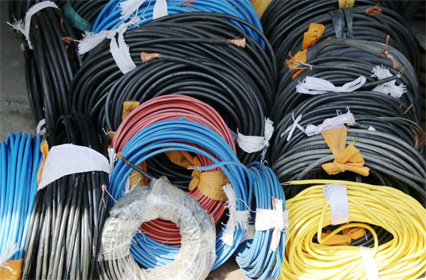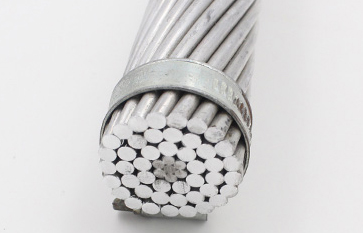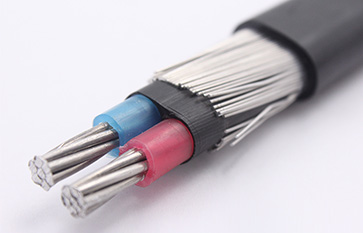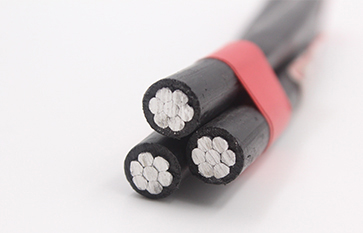What are the advantages of copper cable and aluminum cable?
Cables include power cables, control cables, concentric cable ,compensating cables, shielded cables, high temperature cables, computer cables, signal cables, coaxial cables, fire resistant cables, marine cables, mining cables, aluminum alloy cables, etc., all of which are single-unit or A multi-strand wire and an insulating layer are used to connect circuits, electrical appliances, and the like. Copper core cables have more advantages than aluminum core cables: 1. Low resistivity: The electrical
Cables include power cables, control cables, concentric cable,compensating cables, shielded cables, high temperature cables, computer cables, signal cables, coaxial cables, fire resistant cables, marine cables, mining cables, aluminum alloy cables, etc., all of which are single-unit or A multi-strand wire and an insulating layer are used to connect circuits, electrical appliances, and the like.
Copper core cables have more advantages than aluminum core cables:
1. Low resistivity: The electrical resistivity of the aluminum core cable is about 1.68 times higher than that of the copper core cable.
2. Good ductility: The elongation of copper alloy is 20~40%, the elongation of copper for electricians is above 30%, and the aluminum alloy is only 18%.
3. High strength: Allowable stress at room temperature, copper is 7~28% higher than aluminum. Especially the stress at high temperature, the difference between the two is far.
4. Anti-fatigue: Aluminum is easy to break under repeated bending, and copper is not easy. In terms of elasticity, copper is also about 1.7 to 1.8 times higher than aluminum.
5. Good stability, corrosion resistance: copper core is resistant to oxidation and corrosion, and aluminum core is susceptible to oxidation and corrosion.
6. Large current carrying capacity: Due to the low resistivity, the copper core cable of the same cross section is about 30% higher than the allowable current carrying capacity of the aluminum core cable (the maximum current that can be passed).
7. Low voltage loss: Due to the low resistivity of the copper core cable, the same current flows in the same section. The copper core cable has a small voltage drop. Therefore, the same transmission distance can guarantee a higher voltage quality; or, under the allowable voltage drop condition, the copper core cable transmission power reaches a long distance, that is, the power supply coverage area is large, which is conducive to network planning and reduction. The number of power points set.
8. Low heating temperature: Under the same current, the copper conductor of the same section has a much lower heat generation than the aluminum core cable, making the operation safer.
9. Low energy consumption: Due to the low resistivity of copper, it is obvious that the power loss of copper cables is lower than that of aluminum cables. This is conducive to improving power generation efficiency and protecting the environment.
10. Anti-oxidation, corrosion resistance: The connector of the copper core cable has stable performance and will not cause accidents due to oxidation. When the joint of the aluminum core cable is unstable, the contact resistance is increased due to oxidation, and an accident occurs due to heat generation. Therefore, the accident rate is much larger than that of copper core cables.
11. Convenient construction: 1 The copper core is flexible, and the allowable bending radius is small, so the turning is convenient and the pipe is easy to wear; 2 the copper core is resistant to fatigue and repeated bending is not easy to break, so the wiring is convenient; 3 the mechanical strength of the copper core is high, It can withstand large mechanical tension, which brings great convenience to construction and laying conditions for mechanized construction.
Advantages of aluminum core cable over copper core cable
1. The price is cheap: the copper rod is 3.5 times the price of the aluminum rod, and the specific gravity of the copper is 3.3 times that of the aluminum. Therefore, the aluminum core cable is much cheaper than the copper core cable, and is suitable for low-cost projects or temporary electricity.
2. The cable is very light: the weight of the aluminum core cable is 40% of the copper core cable, and the construction and transportation cost are low.
3. Anti-oxidation, corrosion resistance: Aluminum reacts with oxygen in air to form an oxide film, which can prevent further oxidation. Therefore, aluminum wire is a necessary material for high-voltage, large-section, large-span overhead transmission.
Despite the low cost of aluminum core cables, copper cables have outstanding advantages in cable power supply, especially in the field of underground cable power supply. Underground copper core cable power supply features low accident rate, corrosion resistance, high reliability, and convenient construction and maintenance. This is also the reason why copper cables are mainly used in underground cable power supply in China.








